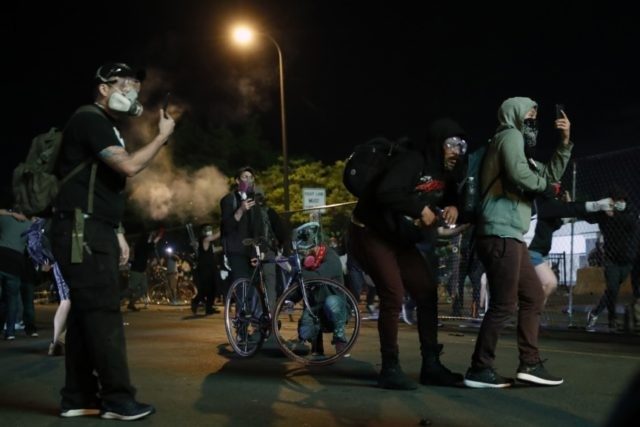DELRAY BEACH, Fla. (AP) — As unrest spread across dozens of American cities on Friday, the Pentagon took the rare step of ordering the Army to put several active-duty U.S. military police units on the ready to deploy to Minneapolis, where the police killing of George Floyd sparked the widespread protests.
Soldiers from Fort Bragg in North Carolina and Fort Drum in New York have been ordered to be ready to deploy within four hours if called, according to three people with direct knowledge of the orders. Soldiers in Fort Carson, in Colorado, and Fort Riley in Kansas have been told to be ready within 24 hours. The people did not want their names used because they were not authorized to discuss the preparations.
The get-ready orders were sent verbally on Friday, after President Donald Trump asked Defense Secretary Mark Esper for military options to help quell the unrest in Minneapolis after protests descended into looting and arson in some parts of the city.
Trump made the request on a phone call from the Oval Office on Thursday night that included Esper, National Security Advisor Robert O’ Brien and several others. The president asked Esper for rapid deployment options if the Minneapolis protests continued to spiral out of control, according to one of the people, senior Pentagon official who was on the call.
”When the White House asks for options, someone opens the drawer and pulls them out so to speak.” the official said.
The person said the military units would be deployed under the Insurrection Act of 1807, which was last used in 1992 during the riots in Los Angeles that followed the Rodney King trial.
“If this is where the president is headed response-wise, it would represent a significant escalation and a determination that the various state and local authorities are not up to the task of responding to the growing unrest,” Brad Moss, a Washington D.C.-based attorney, who specializes in national security.
Members of the police units were on a 30-minute recall alert early Saturday, meaning they would have to return to their bases inside that time limit in preparation for deployment to Minneapolis inside of four hours. Units at Fort Drum are slated to head to Minneapolis first, according to the three people, including two Defense Department officials. Roughly 800 U.S. soldiers would deploy to the city if called.
Protests erupted in Minneapolis this week after video emerged showing a police officer kneeling on Floyd’s neck. Floyd later died of his injuries and the officer, Derek Chauvin, was arrested and charged with third-degree murder and manslaughter on Friday.
The protests turned violent and on Thursday rioters torched the Minneapolis Third Police Precinct near where Floyd was arrested. Mayor Jacob Frey ordered a citywide curfew at 8 p.m. beginning on Friday.
The unrest has since spread across the country, with protests, some violent, erupting in cities including Washington DC, Atlanta, Phoenix, Denver and Los Angelas.
Minnesota Governor Tim Walz ordered 500 of his National Guard troops into Minneapolis, St. Paul, and surrounding communities.
But a Pentagon spokesman said Walz did not ask for the Army to be deployed to his state.
“The Department has been in touch with the Governor and there is no request for Title 10 forces to support the Minnesota National Guard or state law enforcement.” Title 10 is the U.S. law that governs the armed forces, and would authorize active duty military to operate within the U.S.
Alyssa Farah, the White House director of strategic communications said the deployment of active-duty military police is untrue.
“False: off the record – title 10 not under discussion,” said Farah in an email response. No off-record agreement was negotiated with The Associated Press.
The 16th Military Police Brigade forwarded the AP’s questions to the Defense Department.
The three officials with direct knowledge of the potential deployment say the orders are on a classified system, known as the Secret Internet Protocol Router or SIPR for short.
Active-duty forces are normally prohibited from acting as a domestic law enforcement agency. But the Insurrection Act offers an exception.
The Insurrection Act would allow the military to take up a policing authority it otherwise would not be allowed to do, enforcing state and federal laws,”said Stephen Vladeck, a University of Texas School of Law professor who specializes in constitutional and national security law.
The statute “is deliberately vague” when it comes to the instances in which the Insurrection Act could be used, he said. The state’s governor could ask President Donald Trump to take action or Trump could act on his own authority if he’s determined that the local authorities are so overwhelmed that they can’t adequately enforce the law, Vladeck said.
“It is a very, very broad grant of authority for the president,” he added.

COMMENTS
Please let us know if you're having issues with commenting.